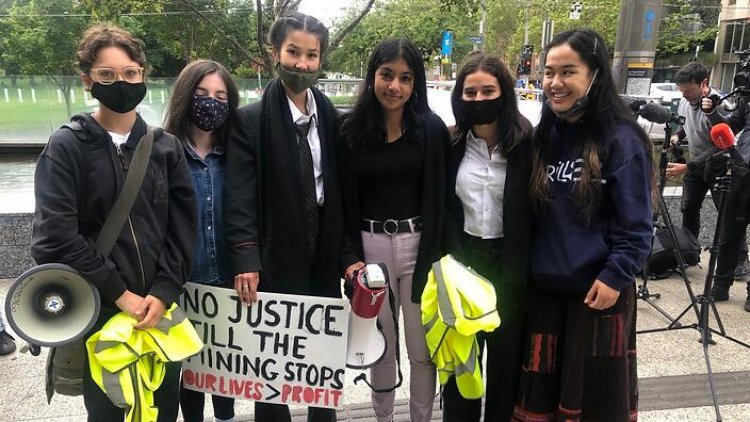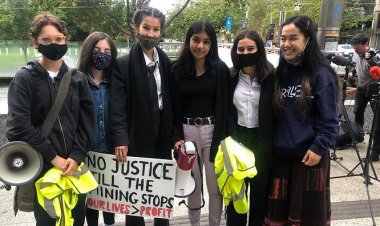Anjali Sharma- Environmentalist- Wins Climate Change Case
17 year old Indian by origin teenager, now settled in Australia since she was a toddler, Anjali Sharma an environmentalist wins ''Climate Change Case'' against the Australian Lawsuit.

About- Anjali Sharma
Anjali Sharma, an Indian-born youngster, wins a climate change lawsuit against the Australian government. She was born in Lucknow and has been a resident of Australia since she was a toddler. She claims that after winning the lawsuit, the court's historic judgment will be highly beneficial to the children. Anjali and her young environmentalist companions have also been congratulated by Greta Thunberg. What is the climate change case of Lucknow youngster Anjali Sharma?
What are the risks of increased global warming? What kinds of issues will youngsters face in particular? Is it possible that global warming will result in the death of children?
These questions may or may not cross your mind, but they afflicted 17-year-old Anjali Sharma, who was born in Lucknow and has lived in Australia since the age of ten months. Anjali of Indian ancestry launched a suit against the Australian government on behalf of all Australian children like her, and the Federal Court issued a landmark ruling. According to the court's ruling, it is the government's responsibility to safeguard and care for children against potential personal damage as a result of climate change. The Australian government is currently preparing a legal appeal to the judgment. Anjali Sharma is a high school student in Australia who lives with her parents. Sharma was nominated for the renowned Children's Climate Prize among worldwide competitors last month, thanks to her enthusiasm. She is one of five young campaigners contending for the award, which will be presented at a ceremony next month.
Anjali is concerned about the environment, and she has enlisted the help of seven young friends to debate and combat environmental concerns. The seven applicants took the coal plant proposal in Gunnedah, New South Wales, to court, claiming that Environment Minister Sussan Ley "owed the children of Australia a duty of care when it came to possible climate change damage." Despite the fact that the court stated in its May judgment that Ley had "a duty to exercise reasonable care to prevent inflicting bodily damage," it did not issue an injunction prohibiting the coal project's development. The ‘Sharma decision,' as the case is called in Australia, was welcomed as a major victory for the teen campaigners, who were commended for their persistent commitment to change.
Last month, though, Ley opted to support the coal project. The Australian government claimed that the "duty of care" described in the judgment could not be established under the Environment Protection and Biodiversity Conservation (EPBC Act), and that Ley's position could not be supported under the EPBC Act. In May of this year, Anjali and her fellow teenage environmentalists filed a lawsuit against the Australian government. Anjali and her coworkers claimed that continuing to emit carbon dioxide into the atmosphere will result in global warming. The woodlands will be set on fire as a result of this. A deluge will occur. Storms and cyclones are certain to occur.
Anjali and her pals are ecstatic at the court's ruling. By the end of the century, these negative environmental changes will have caused other children not just damage, disease, and economic loss, but their lives may also be under serious threat. Anjali and her fellow environmentalists filed a petition against the Australian government, claiming that it was the government's obligation to defend children's interests, safety, and adequate care. Anjali and her pals are ecstatic at the court's ruling. Anjali states that the court's historic judgment will be extremely beneficial to the children. To all Australian children, the government owes it to fight to safeguard my generation from the increasing threat of climate change.
Anjali and her young environmentalist companions have also been congratulated by Greta Thunberg. Greta saw it as a major win for the climate movement as a whole. Of course, the action needed is still nowhere in sight, but these court cases are symbolic breaking points that could have huge snowball effects," Ms. Thunberg had said then.
''Net-Zero Emission''
Australia is facing increasing international criticism for failing to establish more aggressive carbon-reduction objectives. Australia's Prime Minister Scott Morrison agreed to attend the climate summit in Glasgow next month last week, but his cabinet colleagues have yet to ratify a pledge to net-zero emissions.

 Mr.Biller Team
Mr.Biller Team 




























